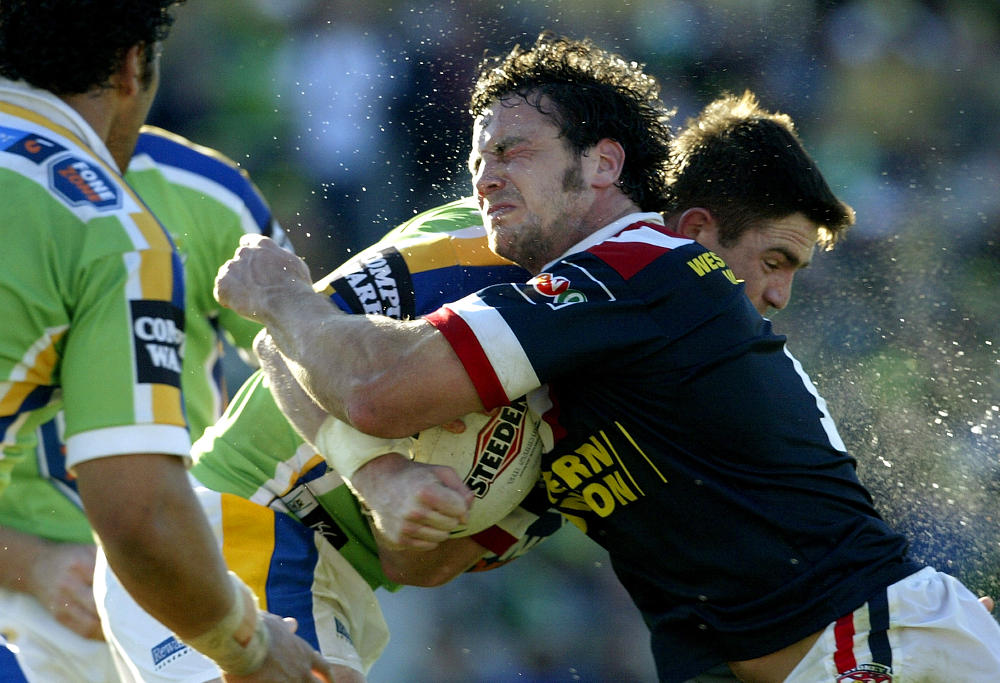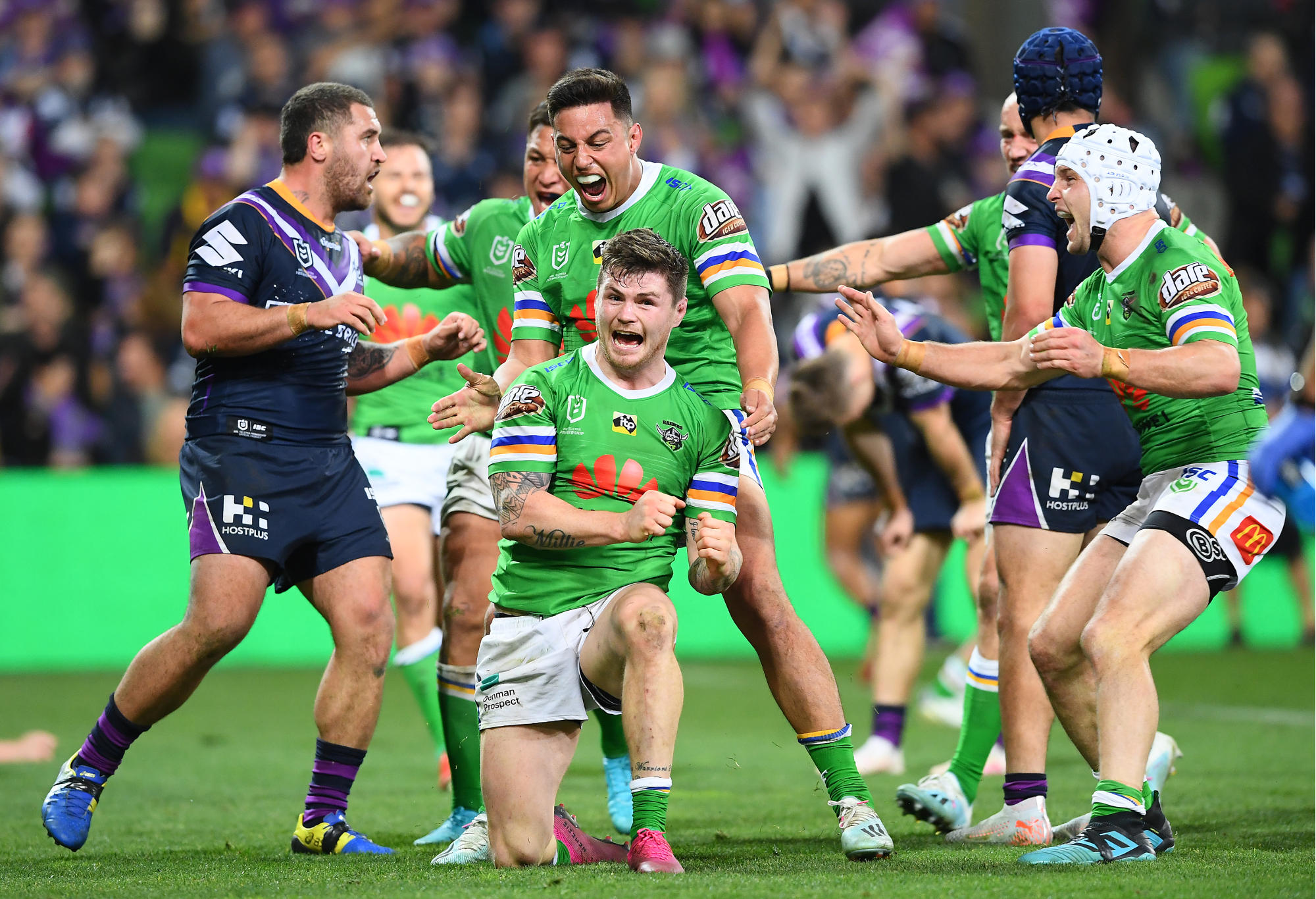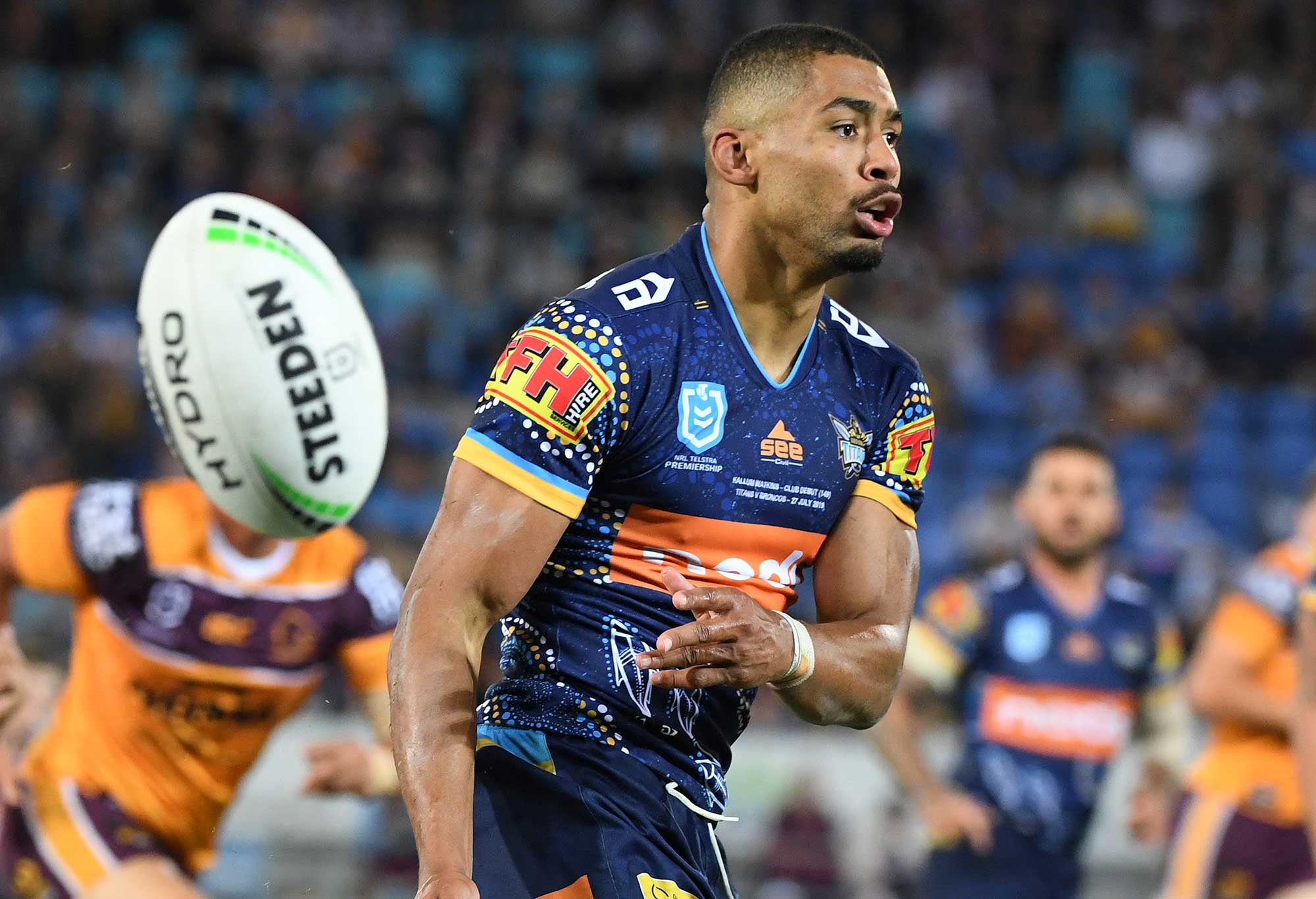Cast your mind back to the world into which the NRL was born. Australia ruled the roost in rugby league, as per usual, having downed the Poms in the Super League Test of 1997 with half a side, but things weren’t as cut and dried as one might think when it came to the club game.
The Aussie clubs in Super League had thrashed their British equivalents in 1997, too, in the ill-fated World Club Championship, but the structural issues that massive benefit NRL clubs today were less evident.
Salary caps were almost the same and, given the exchange rate was nearly three to one in favour of the British pound, plenty of Aussie talent ended up in the UK. Not long before, a fair whack of UK players had made the reverse trip and lit up the Winfield Cup, with some of the greatest imports ever arriving in Australia in the late 1980s and 1990s.
As we cast a glance over the last 25 years of the NRL, one of the interesting benchmarks is the direction of travel relative to the British comp: from 1996, when Super League transitioned to the European summer, to the mid-2000s, UK teams were perhaps at a peak. Between 2000 and 2010, they won seven of ten World Club Challenges, for what that is worth.
As the Aussie game ate itself in the 90s, Britain kicked on and almost caught level. There’s an opus in there about the 2003 Ashes, where GB lost all three games in the last five minutes and were generally the better side, but that’s for another day. Tellingly, it was a low point for migration between comps, as the strength of the pound and the competition kept Brits at home.
Now, any player worth their salt and looking to earn cash comes here. By my count, 40 English and one Irish (and, go on then, two French) players have played in the NRL since 1998, with Tom Burgess top on 215 (and counting) and Tyrone McCarthy and Mark Edmondson bottom on just the two, though a special point for Jordan Turner who featured in the 2017 All Stars game, but never in the NRL proper.
There are more Pommy players in the comp than at almost any other point in history. As we survey 25 years of the NRL, it’s fun to look back at them, from best of Blighty to the truly blighted.
For clarity: this list only includes players predominantly raised in the UK rugby league system, not those who played for England/GB at international level but were raised in Australia (i.e. Victor Radley, Jackson Hastings), or those who were born in the UK but moved to Australia as children (i.e. Ian Roberts, Sam Walker). It also is based solely on performances in the NRL era, from 1998 to 2022.
If you’ve missed it, this is the latest in our series celebrating 25 years of the NRL – and we have already ranked the best fullbacks, wingers, five-eighths, locks, second-rowers, players to never make Origin, coaches, captains, halfbacks, front-rowers, goal-kickers, recruits, heaviest hitters, fights, rookies, Kiwis and Grand Final moments of the era.
CLICK HERE for a seven-day free trial for your favourite sport on KAYO

Adrian Morley of the Roosters in action. (Photo by Mark Nolan/Getty Images)
The top 10 – the best of the best
1 Sam Burgess
2 Adrian Morley
3 Gareth Ellis
4 James Graham
5 Gareth Widdop
6 Tom Burgess
7 Elliott Whitehead
8 John Bateman
9 Josh Hodgson
10 George Burgess
It will tell you a lot that nine of the top ten Poms ever to play in the NRL are forwards, and indeed, that the only one who isn’t moved to Australia when he was 12.
Gareth Widdop just about makes the cut-off for this list – have you heard him speak? – but beyond him, it’s wall to wall hard men.
The toughest job was to pick the top, but eventually, Sam Burgess won out over a wider body of work. He’s the only Pom to win the Clive Churchill Medal and came the closest that any English player has come to the Dally M, second behind joint winners Johnathan Thurston and Jarryd Hayne in 2014.
Behind him is Adrian Morley, as much for his contribution in changing attitudes as anything else. In 2001, when he joined the Roosters from Leeds, he was the only English player in the NRL – as discussed, the exchange rate and relative strength of Super League had something to do with that too – but his work as the hardest man in the comp paved the way for our third place, Gareth Ellis, and later the Burgess clan.
Ellis was the second English winner of the NRL, with the much-loved Tigers of 2005, and was described by Tim Sheens as the best buy the club ever had. He said that a decade ago, and it still stands.
Both the Bulldogs and Dragons might be able to say that about James Graham, too, who was a throwback to the type of forward Australia imported in droves in the 1970s: hard as nails and swift with the hands. His work behind the scenes, as a relentless driver of culture and standards, remains his impact as much as anything he did on the park, too.
Widdop is next on the list, a rarity in a British playmaker who excelled in Australia, and largely because he was able to get into a system that would take anyone – Melbourne – and back them in. It might be just as remarkable that he’s Victorian by State of Origin qualification standards as it is that he’s English.
Tom Burgess is next, with a career that keeps on going even when the rest of his brothers fall by the wayside. While not as iconic as his brother, Tom has actually gotten better with age and grown into the pack leader at one of the best teams in the comp, and an elder statesman to boot.
Next are our trio of Canberrans, Elliott Whitehead, Josh Hodgson and John Bateman. The first two make the top ten on longevity and service, while the latter makes it because of his transcendent two-year spell, allied to the manner of his play, which was quintessentially Super League in style, melding a little bit of skill with a whole lot of dog.
George Burgess, who faded badly with injury, rounds out the top ten after a career that will likely be underrated by history, given his two brothers. On a purely playing level, racking up 150 games in the front row and scoring the try that delivered Souths’ first Premiership back in the comp will secure his legacy.

John Bateman. (Photo by Quinn Rooney/Getty Images)
Best of the rest – elite performers
11 George Williams
12 Herbie Farnworth
13 Brian Carney
14 Lee Jackson
15 Sam Tomkins
16 Dom Young
17 Luke Thompson
18 Ryan Sutton
19 Harvey Howard
20 Mike Cooper
Backing up our Canberra trio is the fourth of that group, halfback George Williams, who departed the league far too early. He was walking proof that British halfbacks could cut it in Australia and, had he been handled better, would probably still be here. His performances at the recent World Cup, where he was England’s best player, lead hope to spring eternal that someone will take a punt on him again.
Also impressing at the recent tournament was Herbie Farnworth, who continues to go from strength to strength in the NRL. His pathway, from junior RL in England to junior RL in Australia, is likely to be the canary in the coalmine for British players in the future, especially outside backs.
Perhaps the best UK back to make it this far has been Irish, with Brian Carney tearing up the NRL for one year in 2006, being named Dally M Winger of the Year after 16 tries in 26 games. Carney, who played park footy in Dublin before moving to the Super League, remains one of the great one-season wonders of the NRL era.
Way back in 1998, there were just two Poms in the league, and the first on our list is Lee Jackson. A wily hooker, he came off the bench in the 1997 ARL Grand Final and started almost every game in ’98, before returning to the UK to join Leeds.
Next is the criminally underrated Sam Tomkins. The current England captain had two years at the Warriors, but never lived up to his billing after the media – quite unfairly – decided he was the British Billy Slater.
Tomkins was good in a middling Warriors team in 2014, but struggled with injury in a poor side in 2015. He went back to Europe, where he had been named Man of Steel in 2012, and is still playing, winning the award again in 2021. I promise you he’s not rubbish.
Next we have three current players: Dom Young, Luke Thompson and Ryan Sutton, all of whom I would expect to feature higher if they continue in the league over time. Thompson is also highly underrated and the sky is the limit for Young.
Harvey Howard – the other 1998 Pom – and Mike Cooper, with three excellent season in the pack for the Dragons in the mid-2010s, round out the list.

Kallum Watkins of the Titans. (AAP Image/Dave Hunt)
The final five/also-rans
21 Luke Burgess
22 Kallum Watkins
23 Mark Flanagan
24 Ian Sibbit
25 Ryan Hall
Our last Burgess, Luke, scrapes into the top 25 on volume of work, though he is a long way behind his brothers.
Kallum Watkins, another who is a better player than his record in Australia would suggest, got just six games in a phenomenally bad Titans team in 2019 and then was forced to depart during Covid after a family emergency, with lockdowns stopping him from returning.
Mark Flanagan was an effective cog in the late 2000s Tigers team and Ian Sibbit played a similar role in the early 2000s at Melbourne before carving out a more than solid Super League career.
Last, but very much not least, is beloved Ryan Hall. The Roosters winger is something of a joke given his 11 games and no tries for the Chooks, but remains one of the best of his generation: six in nine against the Kangaroos and four in six against the Kiwis don’t happen if you can’t play.
When he lies his head on his pillow at night, doubtless his thoughts wander to Townsville on July 9, 2020, when Matt Ikuvalu scored five on one side and he got zero on the other. If you remember that game, Hall had one incorrectly wiped by the bunker that would have opened the scoring.































































































